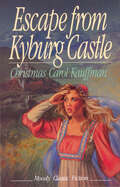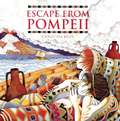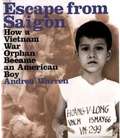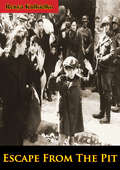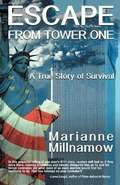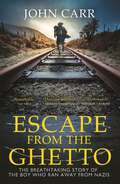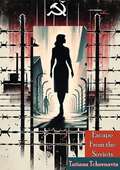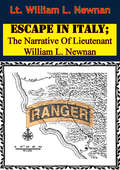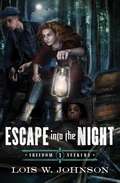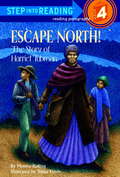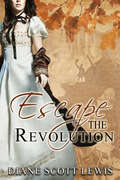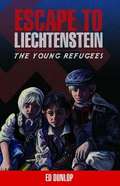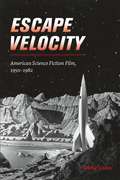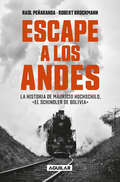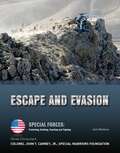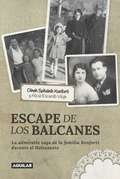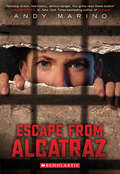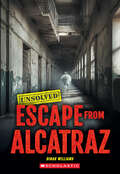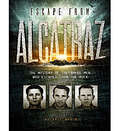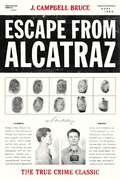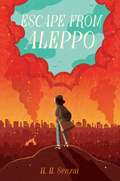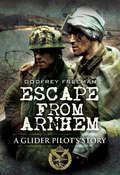- Table View
- List View
Escape From Kyburg Castle
by Christmas Carol KauffmanAnxious, trying times describe Switzerland in the early 1500s.Large numbers of Anabaptists are imprisoned. In fact, Kyburg Castle is full. Yet they won't fight. The more they are punished, the larger their group becomes.And Regina wonders...A mandate demands the drowning of anyone who rebaptizes another. But the Anabaptists continue to do so. What's more, they won't reveal who baptized them, even at the threat of torture.And Regina wonders...She wonders why more and more good people are risking their lives by abandoning the state religion. She wonders if indeed her spiritual welfare was taken care of when she was an infant. She wonders how the captivating Peter Reimann can justify leading prisoners up the hill to the tower prison.She wonders, becomes informed, then makes a decision.
Escape From Pompeii
by Christina BalitThe eruption of Mount Vesuvius in AD 79 destroyed Pompeii, but some people must have survived. Taking this historical event as a starting point, this story tells of Tranio, an actor's son, and his friend Livia, the baker's daughter, as they witness the destruction of their beloved city.
Escape From Saigon: How a Vietnam War Orphan Became an American Boy
by Andrea WarrenAn unforgettable true story of an orphan caught in the midst of war Over a million South Vietnamese children were orphaned by the Vietnam War. This affecting true account tells the story of Long, who, like more than 40,000 other orphans, is Amerasian -- a mixed-race child -- with little future in Vietnam. Escape from Saigon allows readers to experience Long's struggle to survive in war-torn Vietnam, his dramatic escape to America as part of "Operation Babylift" during the last chaotic days before the fall of Saigon, and his life in the United States as "Matt," part of a loving Ohio family. Finally, as a young doctor, he journeys back to Vietnam, ready to reconcile his Vietnamese past with his American present. As the thirtieth anniversary of the end of the Vietnam War approaches, this compelling account provides a fascinating introduction to the war and the plight of children caught in the middle of it.
Escape From Slavery: A Family's Fight for Freedom (Barbour Book's The American Adventure, Book #16)
by Norma Jean LutzTim Allerton is angry. At school, Hollis Bodley tries to outdo Tim in everything and openly makes fun of Tim's anti-slavery views. At home, Tim's father constantly reminds him to keep his opinions to himself because their family business depends on customers from the South. Pam, Tim's younger sister, doesn't understand why he has a problem with slavery in the first place. "Slaves are treated just like family," she says. Then Tim and Pam are put into a situation where they can save the life of a slave baby whose mother has just been killed. Will Pain change her views on slavery . . . or will she continue to ignore the problem? And when a move to drive black people out of the section of the city called "Little Africa" puts Tim's good friend Ward Baker in danger, how can he help?
Escape From The Pit
by Renya KulkielkoBorn near Kielce of ill-fated memory, Renya Kulkielko and her two brothers (now in Displaced Persons camps) are the sole survivors of a family of eight. Reading this tragic and exciting book will explain why she is fortunate in still having two brothers - and in being alive and at work in a Palestine kibbutz! World War II broke out when Renya Kulkielko was only fifteen. The days of horror that followed, her ghastly experiences in ghettos, concentration camps and prisons, are described in dramatic detail. The tale of her escapes from death - that can only be described as miraculous - and of her final departure for Eretz Israel gives us a book that fills our eyes with tears and our hears with pain. "Can human beings be guilty of such acts of studies and continuous cruelty as were the Nazis in Poland and throughout Europe?" we ask ourselves. The answer is yes: and also that humans can rise to such heights of steadfastness and heroism as did so many of the Jews described in Escape from the Pit.--Print Ed.
Escape From Tower One: The True Story of How Vincent Borst Survived the 9/11 Attack on the World Trade Center and Led Others to Safety From the 82nd Floor of the North Tower
by Marianne MillnamowThe true story of Vinnie Borst, an employee of the Port Authority, who survived the 9/11 Attack on the World Trade Center and led others to safety from the 82nd floor of the North Tower. A compelling account of one man's heroic actions in the face of tragedy. A third of the proceeds from the sale of this book will go to two funds: the Edward T. Strauss Memorial Fund (www. WithEddiesHelp. org) to assist those with disabilities and combat homelessness AND the Aspiring Kindness Foundation, a 501(c)(3) not-for-profit public corporation that provides financial assistance to support and enhance the abilities of emergency responders and service providers (www. aspiringkindness. org).
Escape From the Ghetto: The Breathtaking Story of the Jewish Boy Who Ran Away from the Nazis
by John Carr'Trust me, this is a great true story' - Ken Follett'This is an unbelievable story that is all completely true. The life described is astonishing. John Carr has done an extraordinary and riveting job uncovering the real father behind the dad he thought he knew.' - Lord Tony Hall'Utterly Compelling. It is an extraordinary tale, brilliantly written' - Alastair Stewart'Extraordinary. An adventure story in the most terrible circumstances, a kid facing the most desperate dangers but taking fantastic risks with great boldness' - Fiona MacTaggart'The remarkable story of a Jewish boy who killed a Nazi guard and escaped the Holocaust aged 13' - The Times'Unputdownable. A gripping, life affirming story of survival against seemingly impossible odds.' - Deborah Cadbury, author of Prince at War~~~~~The captivating true story of one boy's flight across Europe to escape the Nazis. A tale of extraordinary courage, incredible adventure, and the relentless pursuit of life in the face of impossible challenges. In early 1940 Chaim Herszman was locked in to the Lódz Ghetto in Poland. Hungry, fearless and determined, he goes on scavenging missions outside the wire limits, until he is forced to kill a Nazi guard. That moment changes the course of his life, and sets him on an unbelievable adventure across enemy lines. Chaim avoids grenade and rifle fire on the Russian border, shelters with a German family in the Rhineland, falls in love in occupied France, is captured on a mountain pass in Spain, gets interrogated as a potential Nazi spy in Britain, and eventually fights for everything he believes in as part of the British Army. He protects his life by posing as an Aryan boy with a crucifix around his neck, and fights for his life through terrible and astonishing circumstances. Escape from the Ghetto is about a normal boy who faced extermination by the Nazis in the ghetto or a Nazi deathcamp, and the extraordinary life he led in avoiding that fate. It's a bittersweet story about epic hope, beauty amidst horror, and the triumph of the human spirit.John Carr is Henry Carr's eldest son, and in Escape From the Ghetto he has recreated his father's incredible adventure, through recordings and transcribed conversations in later life.For fans of The Tattooist of Auschwitz, The Saboteur of Auschwitz and The Volunteer, this is the incredible true story of escape from the Nazis during World War II.
Escape From the Ghetto: The Breathtaking Story of the Jewish Boy Who Ran Away from the Nazis
by John Carr'Trust me, this is a great true story' - Ken Follett 'It deserves to be ranked among the great survival stories of the Second World War' - The Jewish Chronicle ~~~~~ The captivating true story of one boy's flight across Europe to escape the Nazis. A tale of extraordinary courage, incredible adventure, and the relentless pursuit of life in the face of impossible challenges. In early 1940 Chaim Herszman was locked in to the Lódz Ghetto in Poland. Hungry, fearless and determined, he goes on scavenging missions outside the wire limits, until he is forced to kill a Nazi guard. That moment changes the course of his life, and sets him on an unbelievable adventure across enemy lines. Chaim avoids grenade and rifle fire on the Russian border, shelters with a German family in Berlin, falls in love in occupied France, is captured on a mountain pass in Spain, gets interrogated as a potential Nazi spy in Britain, and eventually fights for everything he believes in as part of the British Army. He protects his life by posing as an Aryan boy with a crucifix around his neck, and fights for his life through terrible and astonishing circumstances. Escape from the Ghetto is about a normal boy who faced extermination by the Nazis in the ghetto or a Nazi deathcamp, and the extraordinary life he led in avoiding that fate. It's a bittersweet story about epic hope, beauty amidst horror, and the triumph of the human spirit. John Carr is Henry Carr's eldest son, and in Escape From the Ghetto he has recreated his father's incredible adventure, through recordings and transcribed conversations in later life. For fans of The Tattooist of Auschwitz, The Saboteur of Auschwitz and The Volunteer, this is the incredible true story of escape from the Nazis during World War II. REVIEWS 'John Carr deserves our gratitude for rescuing this World War Two story, among the most dramatic and vivid I've read.' - Edward Stourton, author of Cruel Crossing 'This is an unbelievable story that is all completely true. The life described is astonishing. John Carr has done an extraordinary and riveting job uncovering the real father behind the dad he thought he knew.' - Lord Tony Hall 'Utterly Compelling. It is an extraordinary tale, brilliantly written' - Alastair Stewart 'Extraordinary.'- Fiona MacTaggart 'The remarkable story of a Jewish boy who killed a Nazi guard and escaped the Holocaust aged 13' - The Times 'Unputdownable. A gripping, life affirming story of survival against seemingly impossible odds.' - Deborah Cadbury, author of Prince at War 'This is a book you cannot put down... Passionate and spellbinding, and an absolute must read.' - Julia Neuberger "John Carr's book gives a truly riveting account of his teenage Dad's life on the run in Nazi-occupied Europe. It serves as a reminder of the cruel and arbitrary realities of the refugee experience. It won't be on Priti Patel's reading list but it should be on yours." - Jon Bloomfield "An eloquent tribute to courage and resourcefulness, Escape from the Ghetto, is a gripping page turner." - Esther Safran Foer "One of the most extraordinary books I have ever read" - Michael Dobbs, author of House of Cards
Escape From the Soviets
by Tatiana TchernavinEscape From the Soviets by Tatiana Tchernavin is a gripping and deeply personal memoir of survival, resilience, and courage during one of the darkest periods in Soviet history. Written with raw honesty and vivid detail, the book chronicles Tatiana and her husband Vladimir’s harrowing journey to escape the oppressive Soviet regime in the early 1930s.Tatiana recounts the couple’s experiences as they faced constant surveillance, political persecution, and the brutal realities of life under Stalin’s rule. Vladimir, a fisheries expert, becomes a target of the Soviet government’s purges, forcing the couple to make the perilous decision to flee the country. Their journey takes them through treacherous landscapes, from the frozen tundra to dense forests, as they navigate hostile terrain, evade capture, and confront the physical and emotional toll of their flight.This memoir is not only a thrilling tale of escape but also a poignant commentary on the human spirit’s ability to endure and overcome unimaginable adversity. Through Tatiana’s eyes, readers gain a firsthand perspective on the Soviet regime’s impact on individual lives, families, and communities, as well as the suffocating atmosphere of fear and repression that defined the era.Rich with suspense, heartache, and moments of hope, Escape From the Soviets offers a rare and invaluable glimpse into a world of oppression and resistance. Tatiana Tchernavin’s story stands as a testament to the strength of love, loyalty, and the indomitable will to be free.This powerful memoir is an essential read for those interested in Soviet history, personal narratives of resistance, and the enduring fight for liberty.
Escape In Italy; The Narrative Of Lieutenant William L. Newnan
by Lt. William L. NewnanDuring the bloody fighting of the Second World War the hills, river valleys and hellish attrition of the Italian campaign are often overlooked as a sideshow. However some of the toughest fighting and heroic actions of the entire period took place in the beautiful but deadly Italian countryside; one such tale is that of Lt. Newnan. Then as now, the Army Rangers get the toughest assignments, Lt. Newnan and his men were tasked with attacking Cisterna during the Anzio campaign. The elite, but lightly armed, Rangers were ambushed by German Panzer forces, outnumbered and outgunned many Rangers were captured including the author. Not one to be so easily defeated Lt. Newnan began an epic journey of escape and evasion in Nazi infested Italy which he recounts in this vivid and colorful memoir.
Escape Into The Night (Freedom Seekers #1)
by Lois W. Johnson"I want a never-give-up family," Libby Norstad tells her widowed father, captain of the steamboat Christina. "I want a family that believes in me, even when I'm not perfect. A family that sticks together, even though it's hard. " "We can be that family for each other," Pa promises. "And Caleb and the other people who work on the Christina will be our larger family. " But Libby has lived with a wealthy aunt since her mother died and discovers a different world. In 1857, when rivers were the highways of the time, Libby, her father, and their friends face life-and-death questions still crucial today: Who can I trust? What does it mean to put my faith in God? To live my belief in the freedoms sought in the Declaration of Independence? And how can I help others, even at great cost? Soon Libby discovers the secret work of 14-year-old Caleb, a conductor in the Underground Railroad. Next, a fugitive slave named Jordan takes refuge on the Christina. Then another family, Emma and little Henry, pushes toward a choice. Will her journey to compassion help her become a Freedom Seeker? From the golden age of steamboats, the rush of immigrants to new land, and the dangers of the Underground Railroad come true-to-life stories of courage, integrity, and suspense. In Escape into the Night, the first Freedom Seekers novel, as well as others in the 1857 series, Lois Walfrid Johnson uses strong historical interest to bring alive a critical time in American history. The Freedom Seekers series is a six-novel middle-reader set in 1857. Feel the rush of immigrants to the new land, and the dangers of the Underground Railroad in these true-to-life Riverboat stories. The characters will receive a heart-warming response from readers of all ages. Adult readers will ask themselves, "Would I have been one of those who helped runaway slaves?" Lois Walfrid Johnson uses strong historical research, great writing, and wonderful storytelling to bring alive a critical time in American history.
Escape North! The Story of Harriet Tubman: The Story Of Harriet Tubman (Step into Reading)
by Monica Kulling Teresa FlavinAn easy-to-read, page-turning account of Harriet Tubman's life--from her childhood in slavery to her years as a conductor on the Underground Railroad to her later work as a suffragette and as a spy in the Civil War. This remarkable true story brings to life one of America's greatest female role models.
Escape The Revolution
by Diane Scott LewisForced from France by her devious guardian on the eve of the French Revolution, Countess Bettina Jonquiere must deliver an important package to further the royalist cause. In England, she discovers the package is full of blank papers, the address false and she’s penniless. Stranded in a Cornish village, Bettina toils in a bawdy tavern and falls in love with a man who may have murdered his unfaithful wife. Tracked by ruthless revolutionaries, she must uncover the truth about her father’s murder—and her lover’s guilt—while her life is threatened.
Escape To Liechtenstein (Young Refugees #1)
by Ed DunlopEscape to Liechtenstein by Ed Dunlop is a historical fiction account of Hans and his sister Gretchen who discover a young Jewish boy hiding from Nazi troops. While all three children know that Jacob will not be safe until he crosses over the Austrian border, Hans and Gretchen have no idea that Jacob is also smuggling something even more important that is valuable to him, to the Jewish people, and to the enemy. Escape to Liechtenstein is the first book in the Young Refugees Series that is Christian fiction set in Europe during WWII.
Escape Velocity: American Science Fiction Film, 1950–1982 (Wesleyan Film Ser.)
by Bradley SchauerToday, movie theaters are packed with audiences of all ages marveling to exciting science fiction blockbusters, many of which are also critically acclaimed. However, when the science fiction film genre first emerged in the 1950s, it was represented largely by exploitation horror films—lurid, culturally disreputable, and appealing to a niche audience of children and sci-fi buffs. How did the genre evolve from B-movie to blockbuster? Escape Velocity charts the historical trajectory of American science fiction cinema, explaining how the genre transitioned from eerie low-budget horror like It Came from Outer Space to art films like Slaughterhouse-Five, and finally to the extraordinary popularity of hits like E.T. Bradley Schauer draws on primary sources such as internal studio documents, promotional materials, and film reviews to explain the process of cultural, aesthetic, and economic legitimation that occurred between the 1950s and 1980s, as pulp science fiction tropes were adapted to suit the tastes of mainstream audiences. Considering the inescapable dominance of today’s effects-driven blockbusters, Escape Velocity not only charts the history of science fiction film, but also gives an account of the origins of contemporary Hollywood.
Escape a los Andes
by Raúl Peñaranda Robert BrockmannLa desconocida historia del “Schindler de Bolivia”, que salvó de morir en el Holocausto a miles de refugiados judíos. Mauricio Hochschild fue un empresario minero de origen judío alemán y uno de los hombres más acaudalados de su tiempo en América. Su sede central estuvo en Chile, la fuente de su riqueza en Bolivia y abrió oficinas en Perú y Argentina, cuya nacionalidad adoptó después de perder la alemana en 1933 a causa del nazismo. Gracias a él, que movió recursos y su influencia política, cerca de veinte mil judíos provenientes de Alemania, Austria y Polonia, Checoslovaquia, Hungría e Italia llegaron a Bolivia desde fines de los años treinta. A través de una serie de documentos de reciente descubrimiento, de múltiples entrevistas y una acuciosa investigación, los autores —destacados periodistas— han podido reconstruir no solo los esfuerzos de Hochschild por salvar al mayor número posible de judíos, sino también examinar sus enormes habilidades, las críticas que debió enfrentar, las denuncias de que fue un explotador, el peligro de muerte que soportó debido a los tiempos volátiles y revolucionarios en Bolivia, y no menos importante, su extraordinaria y compleja vida amorosa y familiar.
Escape and Evasion (Special Forces: Protecting, Building, Te)
by Jack MontanaOperating behind enemy lines takes nerve, courage, and skill. Above all, it requires the knowledge of how to stay undetected and how to escape if need be. These are the lessons of Escape and Evasion. The book covers all the essential skills of an undercover soldier. Infiltration by land, sea, and air are described in detail. The unique physical demands of night fighting are explained. Tracking techniques are also revealed, showing how the elite soldier can tell where the enemy is from broken twigs and dropped litter. In addition, this book explains some of the most surprising features of behind-the-lines operations, including: * How you can fool a tracker dog * Why you should look at the outline of shapes at night. * How you can calculate the distance of an enemy from a gunshot. * Why you should put bits of tape on all metal objects you carry. * What the best place is for an ambush.
Escape de los Balcanes: La admirable saga de la familia Konforti durante el Holocausto
by Dinah Spitalnik Alicia EscardóRecreada con la intensidad de una novela, esta asombrosa crónica está bordada de aromas, sabores y costumbres que acompañan a esta familia en su peripecia entre la guerra y la dignidad humana. Dos mujeres narran como en torrente aquellos años de incertidumbres y miedo. Una menciona truenos en la noche. La otra le dice que eran disparos de metralleta. Hablan de aquella familia musulmana que los auxilió, del peso de las monedas cosidas en la ropa interior y del aire gélido de las montañas que debieron atravesar para escapar. Pasaron más de setenta años del holocausto en los Balcanes y Dinah escucha asombrada esta conversación entre su madre y tía abuela. Empieza a entender tantas cosas, a unir recuerdos, a evocar el aroma de las recetas de la abuela y comprender que fueron su silenciosa forma de rememorar# Tiempo después, un inesperado correo disparará definitivamente su búsqueda, con el objetivo de completar el legado. Escape de los Balcanes recoge el viaje de descubrimiento que emprende Dinah por Macedonia, Kosovo y Albania, rutas por las que su familia deambuló para sobrevivir, y las vivencias de los Konforti entre 1940 y 1944, cuando empiezan las persecuciones a los judíos. Recreada con la intensidad de una novela, esta asombrosa crónica está bordada de aromas, sabores y costumbres que acompañan a esta familia en su peripecia entre la guerra y la dignidad humana.
Escape from . . . the 1916 Shark Attacks (Escape From . . .)
by Mary Kay CarsonStay out of the water! During the summer of 1916, the "Jersey man-eater"-a great white shark-terrorized the coast of New Jersey. Based on real events, new friends Ed and Mike have to work together to survive one of the deadliest shark attacks in history!In the blistering summer of 1916, Ed Mitchell is melting in the heat wave boiling New York City. All the city pools are closed because of the polio epidemic, so Ed can't wait to flee to the Jersey Shore and cool off in the ocean. But during his first dip, a great white shark attacks a swimmer and sends the coastline into a panic. Ed is sent away from the shore to visit his aunt in Matawan, New Jersey, where he can stay safe and cool.In Matawan, Ed meets Mike Anders-a local boy who knows all the best spots in the nearby creek. Mike vows to teach Ed to swim, and Ed promises to help Mike read better. Little do they know, the new friends are about to have the summer of their lives.The "Jersey man-eater," the dangerous shark who keeps attacking swimmers, is headed right up the coast and into their favorite swimming spot! Will Ed and Mike be able to survive one of the deadliest shark attacks in history?
Escape from Alcatraz (Escape From)
by Andy Marino"Nonstop action, real history, serious danger. You gotta read these books!" -Alan Gratz, #1 New York Times bestselling author of RefugeeMay 1962In the middle of San Francisco Bay looms Alcatraz, home to America’s most infamous prisoners. Also home to Chip Carter and his dad, who works at the high security prison. Their neighbors are former mobsters, gangsters, and murderers, but Chip finds it to be a pretty boring place to live. After all, the inmates can’t hurt him--they’re locked up in an impenetrable fortress, surrounded by unforgiving waters.Or are they?Inmate AZ1441, aka the Watcher, has a plan to break out of Alcatraz. It’s a genius plan he’s concocted along with three other inmates. Foolproof. Or so he thought until one of the guard’s kids stumbles into the middle of it.Chip is stunned. No one can break out of the Rock. Not unless they have an inside guy. Which it seems like they do ... Chip’s dad. They know Chip’s onto them, so if he wants to survive, he’s going to have to make sure these men stay locked up. But first he has to figure out who is planning the prison break and just how deep into this deadly scheme his dad is. Because given what these men have done to end up in Alcatraz, there’s no telling what they’ll do to get out.
Escape from Alcatraz (Unsolved)
by Dinah WilliamsDid any prisoners ever escape Alcatraz? Discover the unsolved mystery in this beautifully illustrated book for kids, accessible for all readers!Alcatraz, once the world's most secure prison, is located on a small island in San Francisco Bay. Throughout its operation, many attempted to escape. In June 1962, three prisoners managed to break out, but they were never heard from again. What happened to them?Discover this unsolved mystery with real clues, facts, and pictures in the pages of this book. The story will unfold with easy-to-read text and exciting visuals. You can decide for yourself what you think happened during this mysterious escape from Alcatraz!ABOUT THIS SERIES:Take a deep dive into some of the most unbelievable but real unsolved mysteries from history. Is the Bermuda Triangle cursed? Do sea monsters exist? Can people just disappear? Each book in this series focuses on one unsolved mystery and describes its main events chronologically. Readers follow along as the exciting narrative uncovers real historical clues. Multiple theories are presented, providing an opportunity for readers to draw their own conclusions. The most up-to-date facts and relevant modern-day discoveries are included to allow for real-world connections. Perhaps you will be the one to solve an unsolved mystery!
Escape from Alcatraz: The Mystery of the Three Men Who Escaped from the Rock
by Eric BraunA 1962 prison break from the notorious island prison in San Francisco Bay will hold readers captive as they consider fact and fiction.
Escape from Alcatraz: The True Crime Classic
by J. Campbell BruceIn 1963, just weeks before the original publication of this book, the last prisoner was escorted off Devil's Island and Alcatraz ceased to be a prison. Author J. Campbell Bruce chronicles in spellbinding detail the Rock's transition from a Spanish fort to the maximum-security penitentiary that housed such infamous inmates as Robert Stroud, aka the Birdman of Alcatraz, and mobster Al "Scarface" Capone. The chapters describing the daring escape attempts by Frank Morris and two accomplices from this "inescapable" prison became the basis for the 1979 Clint Eastwood movie. Discover the intriguing and absorbing saga of Alcatraz, whose name is still synonymous with punitive isolation and deprivation, where America's most violent and notorious prisoners resided in tortuous proximity to one of the world's favorite cities.The true-crime classic first published in 1963 is reissued in this special edition.Includes archival photos of the prison and prison life.This story will appeal to Bay Area locals and tourists alike.Alcatraz hosts more than a million visitors each year.From the Trade Paperback edition.
Escape from Aleppo
by N. H. SenzaiAn Indie Next List Pick <p><p> Nadia’s family is forced to flee their home in Aleppo, Syria, when the Arab Spring sparks a civil war in this timely coming-of-age novel from award-winning author N.H. Senzai.Silver and gold balloons. <p><i>A birthday cake covered in pink roses. A new dress. </i> <p>Nadia stands at the center of attention in her parents’ elegant dining room. This is the best day of my life, she thinks. Everyone is about to sing “Happy Birthday,” when her uncle calls from the living room, “Baba, brothers, you need to see this.” Reluctantly, she follows her family into the other room. On TV, a reporter stands near an overturned vegetable cart on a dusty street. Beside it is a mound of smoldering ashes. The reporter explains that a vegetable vendor in the city of Tunis burned himself alive, protesting corrupt government officials who have been harassing his business. Nadia frowns. <p> It is December 17, 2010: Nadia’s twelfth birthday and the beginning of the Arab Spring. Soon anti-government protests erupt across the Middle East and, one by one, countries are thrown into turmoil. As civil war flares in Syria and bombs fall across Nadia’s home city of Aleppo, her family decides to flee to safety. Inspired by current events, this novel sheds light on the complicated situation in Syria that has led to an international refugee crisis, and tells the story of one girl’s journey to safety.
Escape from Arnhem: A Glider Pilot’s Story
by Godfrey FreemanThis is the remarkable true story of a young army glider pilots experience of the last days in the defense of Arnhem Bridge, his eventual capture and then escape to be adopted by the Resistance, the hair-raising journey through occupied Europe and his eventual return to the UK. After capture Freeman was first taken to Apeldoorn where he was hospitalized, claiming shell-shock. Although quite sane, he feigned trauma with escape in mind, until being punished for aiding the escape of four Allied inmates. Then he was put on a train bound for Germany, from this he escaped and eventually made contact with the Dutch underground. He is given civilian cloths and a bicycle and rides overnight to Barnveld where he stays with a schoolmaster and church organist. Then another cycle ride to a farm where he sleeps in the hayloft and finally still on his bike, he rides through the German front lines. He eventually is returned to RAF Broadwell by Dakota to resume his part in the war, from capture to freedom within a month. The text is interspersed with flashbacks to the authors childhood and early training, capturing the true spirit of a typical modest and yet outstandingly brave young man of the wartime era.
